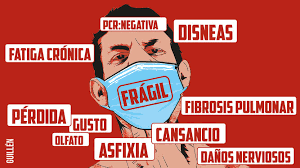The growing scientific evidence regarding SARS-CoV-2 focuses more and more on the sequelae derived from Covid-19 and the possible persistent symptoms after overcoming the infection. On October 11, the World Health Organization (WHO) published the first official clinical definition of the «post-COVID-19» disease , known as «persistent Covid-19» , agreed after a global consultation with the aim of facilitating treating the sick.
«Post-Covid-19 condition occurs in individuals with a history of probable or confirmed SARS-CoV-2 infection , usually three months after the onset of Covid-19 with symptoms lasting at least two months and not can be explained by an alternative diagnosis. The most common symptoms are fatigue , shortness of breath and cognitive dysfunction , but other symptoms can also occur that usually affect the daily functioning of the patient. Symptoms may be new, after initial recovery from an acute episode of Covid-19, or may persist from the onset of the disease. Symptoms can also fluctuate or there may be relapses over time. For children, another definition may be applicable «, defines the UN agency.

Various studies have focused their efforts on determining how many of those who overcome Covid-19 develop persistent Covid. The figures move within a wide range of percentages , and some research indicates that it not only affects those who have the disease moderately and / or severely, but it can also appear in those with mild and even asymptomatic infection .
In this context, we focus on a recent research conducted by the Penn State College of Medicine. According to their findings, more than half of the 236 million people diagnosed with Covid-19 since December 2019 will experience subsequent and persistent symptoms of the disease for up to six months after recovery . A fact with which they warn governments and health systems of the need to prepare for the large number of people who will need medical attention for these symptoms, which are both physical and psychological.
Those responsible for the study have carried out a systematic review of 57 reports that bring together data from 250,351 unvaccinated adults and children diagnosed with Covid-19 between December 2019 and March 2021. Of these, 79% required hospital admission, the majority lived in high-income countries and the mean age was 54 years (56% male). The researchers looked at the patients’ health at different intervals: one month, two to five months, and more than six months after they recovered from the infection.
WIDE VARIETY OF PERSISTENT SYMPTOMS
According to the research findings, patients experienced a wide variety of residual health problems associated with SARS-CoV-2 infection . These complications affected their general well-being, their mobility or their organ systems. Overall, one in three survivors experienced persistent Covid, with rates more or less constant across the three intervals analyzed.
Among the main conclusions of the study are:
- More than half of all patients reported weight loss , fatigue , fever, or pain .
- About one in five experienced decreased mobility .
- Almost one in four have reported trouble concentrating .
- Almost one in three patients has been diagnosed with a generalized anxiety disorder .
- Six out of 10 patients had abnormal chest imaging, and more than a quarter of the patients had breathing difficulties .
- Among the most common conditions are palpitations and chest pain .
- Almost one in five patients experienced hair loss and / or rashes .
- The stomach pain , the lack of growing appetite , the diarrhea and vomiting are among the most common health problems after overcoming the infection.
«These findings confirm what many healthcare workers and survivors of Covid-19 have been claiming for a long time, that adverse health effects of Covid-19 can persist,» explains co-lead investigator Vernon Chinchilli , chair of the Department of Public Health Sciences at Penn State College of Medicine, in a statement.
“Although previous studies have examined the prevalence of Covid-19 symptoms, this study has looked at an older population, including people from high-, middle- and low-income countries and a wide variety of symptoms. So we think our findings are robust enough, ”he adds.
THE NEXT BIG GLOBAL PUBLIC HEALTH ISSUE
«The burden of ill health for survivors of Covid-19 is overwhelming,» explains co-lead investigator Dr. Paddy Ssentongo , a professor at Penn State College of Medicine for Neural Engineering , in the same statement . “Among these are mental health issues and it is important to note that one’s battle against Covid-19 does not end with recovery from acute infection. Vaccination is our best ally to avoid the disease and thus reduce the chances of persistent Covid ”.
The scientific community does not fully understand why these symptoms persist after the infection has passed. They could be the result of an overload of the immune system caused by the virus, a persistent infection , a possible reinfection, and even the result of an increase in the production of antibodies (directed at your own tissues). It should also be noted that SARS-CoV-2 has the ability to penetrate the nervous system, so taste and / or smell disorders , memory impairment or decreased attention, occur quite frequently among those who achieve overcome infection.
In this sense, Ssentongo explains that the study «was not designed to confirm that Covid-19 is the only cause of these symptoms,» so «it is plausible that the symptoms reported by patients in some studies were due to other causes. » .
Researchers value the role of early intervention in improving the quality of life of those who overcome the infection. They predict an increase in medical visits for psychiatric and cognitive problems such as depression , anxiety or post-traumatic stress disorder . Those responsible for the research ask, with their findings in hand, that health systems and governments plan now and allocate resources to what could become the next great public health problem globally.
Fuente: Consalud
 Blog de Fisioterapia Fisioterapia
Blog de Fisioterapia Fisioterapia



